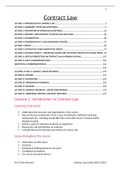Lecture notes
First Class Contract Law (Complete) Notes
- Module
- LAW1071 (LAW1071)
- Institution
- Durham University (DUT)
First Class Contract Law (Complete) Notes is applicable to all UK LLB syllabuses outlining: agreement; offer and acceptance, termination of offers and acceptance, certainty and intention to creat legal relations, consideration, promissory estoppel, privity, contractual terms, critical perspectives ...
[Show more]



